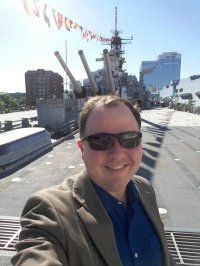Homer Babbitt (M.A., 2003), Chief Development Officer at Nauticus in Norfolk
What is an average day like for you at Nauticus?
My average day often feels like a non-stop series of meetings that deal with everything from keeping a 100+ foot wooden schooner and an 800+ foot Iowa Class Battleship afloat to determining the best ways to keep our signature events the top fundraising events in Norfolk. Mixed in with the crazy meeting schedules I occasionally get the chance to crawl around the non-public areas of the USS Wisconsin, I also get to charter the Schooner Virginia for donor events, and have added to a few historical references to presentations given by colleagues. I have had the honor of talking to many Korean War veterans and even one or two World War Two veterans who served on the Wisconsin. Due to my work with high net worth donors I am involved with some institutional strategic decision making in how we care for our assets and present them to the community. In a world where STEM education is becoming the norm I work hard to make sure History and the rest of the humanities have a place in our community!
Do you work extensively with colleagues from the City of Norfolk? Are there unique challenges pertaining to the promotion of Cultural Tourism and Public History in Norfolk and Hampton Roads?
As a Non-profit Foundation employee working at a city institution I have no choice but to integrate with the city at every level of my job. However, our local cities are very aware of their cultural and historic ties to the region and to the nation. This makes defending the relevance of our assets a little easier, but rarely a given. With possession of the Battleship Wisconsin, Nauticus is the best forward-facing institution to represent the US Navy's role in our region. With the Schooner Virginia, the Nauticus Foundation is also able to represent the region's rich maritime heritage through hands on education in a wooden ship that was built to nearly exact historical specifications. You really get respect from 19th Century mariners when you have help to hoist a 1,000 lbs. main sail up a 60 foot mast without a winch. It is especially fun doing it in a coat and tie!
What skills and intellectual experiences did you acquire in the M.A. program at ODU that have served you well in your subsequent work?
How to build a well-defined argument with a strong case for support is a very valuable skill that I developed during my time in the MA History program. Much of the work I do in community fundraising comes down to the strength of the narratives and case for support that I construct. Also, the ability to embrace two opposing opinions in my mind so that I intelligently navigate through misunderstandings and miscommunications between stakeholders and/or community partners is very important. Having the skill to objectively examine both sides of an issue and lead real world discussions to find resolution has probably become my single greatest take away from the program at ODU.
Which professors do you remember and why from the Department of History at Old Dominion University?
I remember all of them actually! However, Dr. Douglas Greene was my TA advisor and a great professor. Like all of my professors he challenged me to think in new ways, but he also took time to make sure I enjoyed my experience. The only reason I ever lifted my head out of a book to enjoy a spring day was because of Dr. Greene. He also lent me a few good mystery short stories! Another notable character during my time at ODU was Dr. Loraine Lees. She was absolutely my most challenging professor! I grew more academically in her classes than any other professor before or since. Although all of my professors played a role in shaping me into the person I am today, these two always stand out in my memory as key players in my education.
What new areas of historical inquiry have you explored since leaving ODU? Are there certain history books or topics that you especially enjoy?
I have mostly focused on political biographies and autobiographies related to foreign policy, but maritime history makes regular appearances in my reading line up as well. Being an avid cook, I have also taken a bit of an interest in the history of recipes and how "cultural flavors" have evolved. If I were to ever become a published historian my work would likely revolve around cooking in some way.




